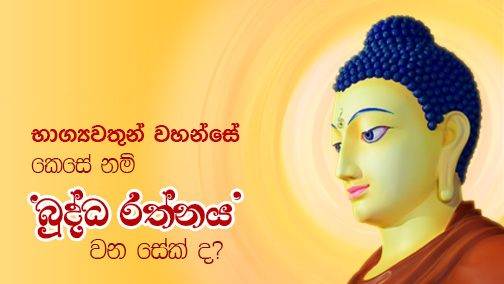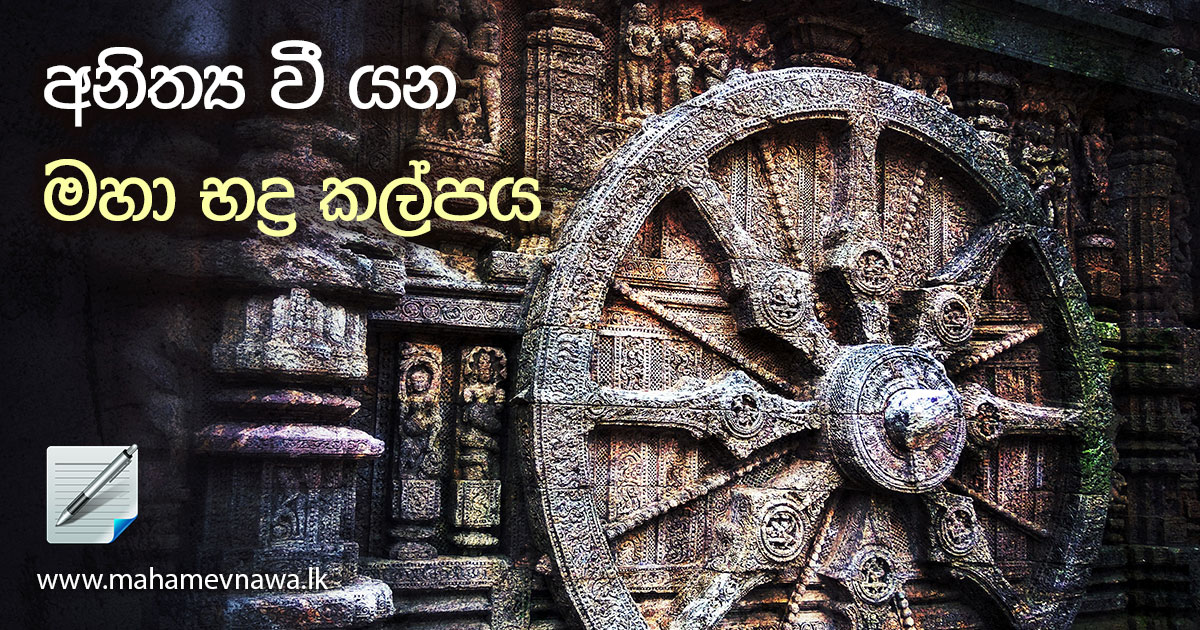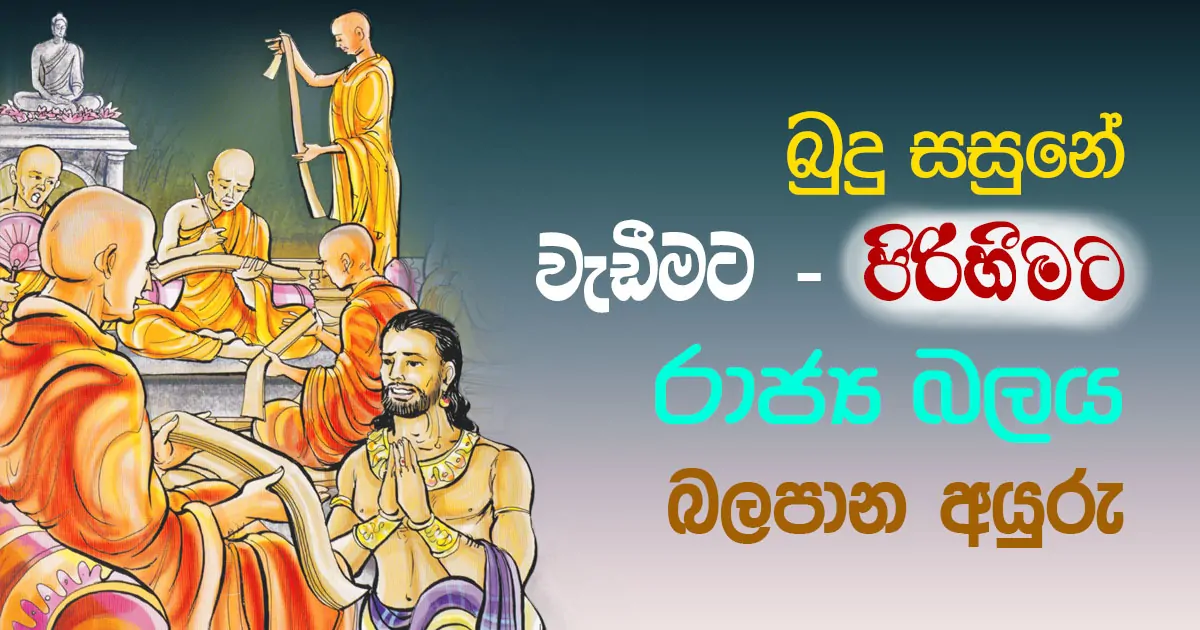Think for a moment. Patāchārā thought about life softly like a butterfly. She lived in a dream world. But she had to face something terrible that she never thought would have happened. She didn’t have any idea about the true nature of life. Her life shattered into pieces when she started to lose everything she loved. She could not bear her pain and became an insane person. She ran everywhere crying senselessly. She lost her common sense so that she couldn’t even realize that her clothes were stripping away from her body. Everyone saw her as a crazy person. None could see that she had skills to realize life. The Supreme Buddha saw all her skills within her clearly. Patāchārā regained her consciousness when the Most Compassionate One talked to her kindly. She quickly put her clothes back on. She became a Bhikkhuni (lady monk) in the Order of the Gautama Buddha. She became virtuous, cultivated the concentration (Samādhi), cultivated the Satara Satipatthāna very well, and became an Arahant by consequently realizing the path-and-fruition. She was the one who was presented the title of chief among virtuous Bhikkhunuis. See, how miraculous that incident was. She had all the skills to realize life, but it was hidden until she received the gift of the Dhamma of the Gautama Buddha.
Think about the story of Kisā Gōtami. She lost her one and only son. This affectionate mother cried in pain when she lost her beloved child. Kisā Gōtami took her child on to her hands and walked in each street looking for a cure for her child. The Supreme Buddha made her see the truth of life. She too became a Bhikkhuni and became an Arahant by practicing the Dhamma well.
There was a rural village called Sunāparanta. No one went to this village because of the bad things spread about the villagers. In fact, they couldn’t be all good, but a Bhikkhu volunteered himself to go visit that village. That Bhikkhu’s name was Punhnha. He requested the Buddha’s permission to go to that village. The Buddha showed him the vicious nature of the villagers in Sunāparanta. The Buddha showed him that if he goes to that village, even his life could be in danger. Punhnha Thero happily accepted that challenge and went to that village. After only few days, the whole village was changed. Those dangerous villagers took refuge in the Triple Gem. Some of them entered the monkhood and developed virtuous qualities… How did that happen? Even though those villagers were known to be vicious people, they had skills in them. When they started to listen to the Dhamma, those skills started to develop in them. If someone realizes the Dhamma after listening to it one day, that person’s skills start to develop gradually.
Adhimutta Thero was a small Bhikkhu. From the sight of him, no one could recognize him as an Arahant. One day, when he was passing through a forest, a group of thieves caught him. They took the Thero to a human-sacrificing offering. Thero didn’t have any fear at all. It amazed the thieves. They asked the Thero how he could stay without fear in front of his death. The Dhamma preached by the Adhimutta Thero opened the eyes of those thieves. Their minds changed completely. They threw away their swords and took refuge in the Triple Gem. Some of them became Bhikkhus and attained the Nibbāna. Isn’t that change occurred due to the Dhamma of the Gautama Buddha?
We get to know about many people who lived in the time of the Gautama Buddha. They had various characteristics. There were dangerous thieves, murderers, prostitutes and etc. among them. Without any regard to what or who they were before they received the gift of the Dhamma, all of them had the chance to realize the Dhamma with no obstacles. This means that we can develop our skills when our lives are open to the Dhamma.
What is meant by ‘skills’ here is not the talent in languages, status of one’s job, artistic talent, ability to sing, clothing styles, talent in drawing, gardening, or business, but the talent to differentiate good from bad and merits from demerits. This ability is within us for sure. We can become virtuous persons when we are able to see that talent and start to use it.
One will be drawn to do anything when he is unable to see good from bad. He will think of anything without any regard to whether it is good and bad. Effort and mindfulness will not be cultivated in him. Still, if someone like him listen to the Dhamma frequently and think about the Dhamma frequently, he will be able to clearly differentiate good from bad. He will try to relinquish bad and cultivate good.
Becoming virtuous is a pleasant thing. Virtuous person is kind towards animals. He doesn’t take others’ belongings without their permission. He will not go to other women except his own wife; a virtuous wife also doesn’t go to other men except her own husband. It is a wholesome virtue. Also, he will not deceive others by telling lies. He would not witness falsely. He will not take intoxicants at any time, even in a wedding party or any other parties. It is a character of his virtue. He will not try to be exaggerated about himself because of that virtue or defame others.
Some realization about life/Dhamma is required for an esteemed virtue. That realization is acquired via faith (Saddhā). Faith is not a blind belief. A person with such blind faith will follow anything without considering it wisely. Saddhā is a something completely different thing. If someone believes that the Buddha has a complete realization, it is his faith. That person with such a faith is talented to think about Buddha’s great qualities one by one and be happy about those qualities. In fact, this is not something that can be done without using wisdom. This means, a faithful person is/has to be indeed a wise person.
Some people learn the Dhamma in order to get respect by pretending them as virtuous and deface qualities of others. They would learn the Dhamma and remember some parts. Then, they would argue with others pretending to have a great wisdom. Such people with low intentions will not be able to realize life. If someone tries to create arguments about the Dhamma to become pretentious, he will only start to decline. The Supreme Buddha showed us that learning the Dhamma to argue with other people is like dragging a snake from its tail; it is very dangerous.
In fact, it is not so easy to take refuge in the Triple Gem. Even though everyone utters the words of taking refuge in the Triple Gem as a practice when they are worshipping the Buddha, no one can just take refuge in the Triple Gem that easily. One can truly take refuge in the Triple Gem only by thinking about the Buddha and His qualities from one’s wisdom and be pleased about Him. It is the same with the Dhamma.
The Dhamma means not just remembering the Buddha’s discourses by heart; not just thinking about the Dhamma that is remembered, but practicing it. Understand the Dhamma in the following manner.
Opposing moral things is not Dhamma. Being stubborn with one’s own false views even when the truth is clearly seen is not Dhamma. Opposing good advices is not Dhamma. Opposing advices given with kind intentions is not Dhamma. Retaliation is not Dhamma. Anger or being angry is not Dhamma. Telling tales about others is not Dhamma. Opposing others with each other is not Dhamma. Being envy of others fortune is not Dhamma. Scolding and accusing others untruthfully is not Dhamma. Taking sides of what’s not Dhamma even in the presence of true Dhamma is not Dhamma. Creating quarrels intentionally hoping for leadership and becoming famous is not Dhamma. Disrespecting respectful persons (teaches, sages, and elders) who advise you is not Dhamma. Following a false lifestyle in order to get rich is not Dhamma… Such unwholesome life patterns and behaviors can be identified due to general ways of a mind that is trapped in the Samsara. If one is capable of identifying these unwholesome behaviors and related demerits quickly and free from them, the Dhamma will be established in him. The Dhamma will start to present in him, and he will get its refuge.
So, what you should do in this Wesak season is to take refuge in the Triple Gem with a clear understanding about it. Contemplate the great qualities of the Supreme Buddha and please your mind about that great teacher. Also, contemplate about the Dhamma and the great Sangha (disciples of the Buddha who attained path-and-fruition). In this way, please your mind about the Triple Gem. It is your basic protection.
After that, observe the five precepts and protect them mindfully. That is your protection. Practice donation as much as you could and learn discourses preached by the Buddha to improve your faith towards the Triple Gem but not to argue about Dhamma contents with others.
Afterwards, start a process to realize the nature of your mind, how merits and demerits form in the mind, how to free yourself from those demerits, and ways to cultivate merits. Follow such a process with effort. You will then be able to come to the Dhamma gradually. It will be like a hole-less pot being filled by droplets of water with the each drop it receives.
By
Most Ven. Kiribathgoda Gnanananda Thero








